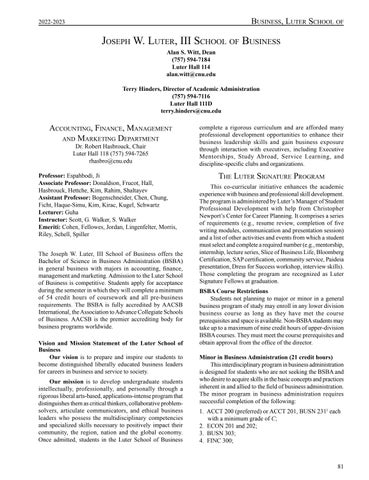BUSINESS, LUTER SCHOOL OF
2022-2023
JOSEPH W. LUTER, III SCHOOL OF BUSINESS Alan S. Witt, Dean (757) 594-7184 Luter Hall 114 alan.witt@cnu.edu Terry Hinders, Director of Academic Administration (757) 594-7116 Luter Hall 111D terry.hinders@cnu.edu
ACCOUNTING, FINANCE, MANAGEMENT AND MARKETING DEPARTMENT Dr. Robert Hasbrouck, Chair Luter Hall 118 (757) 594-7265 rhasbro@cnu.edu
Professor: Espahbodi, Ji Associate Professor: Donaldson, Frucot, Hall, Hasbrouck, Hettche, Kim, Rahim, Shaltayev Assistant Professor: Bogenschneider, Chen, Chung, Ficht, Haque-Simu, Kim, Kirac, Kugel, Schwartz Lecturer: Guha Instructor: Scott, G. Walker, S. Walker Emeriti: Cohen, Fellowes, Jordan, Lingenfelter, Morris, Riley, Schell, Spiller The Joseph W. Luter, III School of Business offers the Bachelor of Science in Business Administration (BSBA) in general business with majors in accounting, finance, management and marketing. Admission to the Luter School of Business is competitive. Students apply for acceptance during the semester in which they will complete a minimum of 54 credit hours of coursework and all pre-business requirements. The BSBA is fully accredited by AACSB International, the Association to Advance Collegiate Schools of Business. AACSB is the premier accrediting body for business programs worldwide. Vision and Mission Statement of the Luter School of Business Our vision is to prepare and inspire our students to become distinguished liberally educated business leaders for careers in business and service to society. Our mission is to develop undergraduate students intellectually, professionally, and personally through a rigorous liberal arts-based, applications-intense program that distinguishes them as critical thinkers, collaborative problemsolvers, articulate communicators, and ethical business leaders who possess the multidisciplinary competencies and specialized skills necessary to positively impact their community, the region, nation and the global economy. Once admitted, students in the Luter School of Business
complete a rigorous curriculum and are afforded many professional development opportunities to enhance their business leadership skills and gain business exposure through interaction with executives, including Executive Mentorships, Study Abroad, Service Learning, and discipline-specific clubs and organizations.
THE LUTER SIGNATURE PROGRAM This co-curricular initiative enhances the academic experience with business and professional skill development. The program is administered by Luter’s Manager of Student Professional Development with help from Christopher Newport’s Center for Career Planning. It comprises a series of requirements (e.g., resume review, completion of five writing modules, communication and presentation session) and a list of other activities and events from which a student must select and complete a required number (e.g., mentorship, internship, lecture series, Slice of Business Life, Bloomberg Certification, SAP certification, community service, Paideia presentation, Dress for Success workshop, interview skills). Those completing the program are recognized as Luter Signature Fellows at graduation.
BSBA Course Restrictions Students not planning to major or minor in a general business program of study may enroll in any lower division business course as long as they have met the course prerequisites and space is available. Non-BSBA students may take up to a maximum of nine credit hours of upper-division BSBA courses. They must meet the course prerequisites and obtain approval from the office of the director. Minor in Business Administration (21 credit hours) This interdisciplinary program in business administration is designed for students who are not seeking the BSBA and who desire to acquire skills in the basic concepts and practices inherent in and allied to the field of business administration. The minor program in business administration requires successful completion of the following: 1. ACCT 200 (preferred) or ACCT 201, BUSN 2311 each with a minimum grade of C; 2. ECON 201 and 202; 3. BUSN 303; 4. FINC 300;
81

